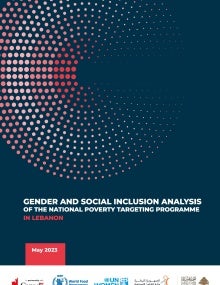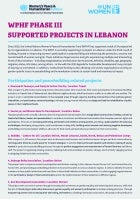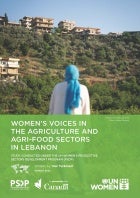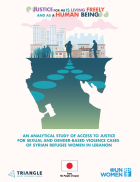1 - 5 of 5 Results
Date:
Since 2020, the United Nations Women’s Peace & Humanitarian Fund (WPHF) has supported a total of 24 projects led by 31 organizations in Lebanon. WPHF is currently supporting 12 projects in Lebanon in 2023/24 under the third round of funding, focused on improving women’s participation in peacebuilding and enhancing the protection, security and mental health of women and girls. These initiatives target women and girls experiencing multiple and intersecting forms of discrimination in line with the 2030 Agenda for Sustainable Development’s key principle of leaving no one behind. In Addition, institutional funding is also allowing civil society organizations working on gender-specific issues in peacebuilding and humanitarian contexts to sustain itself and maximize its impact.
Date:
This study, which examines the conditions of women in Lebanon’s agribusinesses, is the second gender analysis under the Productive Sectors Development Programme (PSDP). UN Women undertook an intersectional gender analysis during PSDP’s baseline phase. The analysis looked at the daily roles and responsibilities of women across fruit and vegetable value chains in the North of Lebanon. It focused on the voices and perspectives of women, recounting the opportunities and challenges in the agriculture sector. It found that women are deeply involved in various agricultural activities but continue to face limited access to resources, such as land and capital; cyclical issues related to personal status laws affecting marriage, family and inheritance; and risks of exploitation due to the high informality of the agriculture sector.
Date:
Gender gaps are widening across all continents and sectors, including agriculture. Although rural women are productive members of their families and societies, their voices are always marginalized: they are not involved in decision-making related to family life, community issues, money, or business. This analytical paper was prepared by UN Women Lebanon. It aims to examine the extent to which the Lebanese legislation and policy frameworks take into account gender diversity and women’s equitable and safe economic participation in the agricultural sector and the agro-food industries.
Date:
This Gender Analysis has been conducted under the PSDP and examines the daily lives and work and care responsibilities of women working across the fruits, vegetables, and nuts agricultural and agri-food value chains in North Lebanon.
The report and photojournalism essays are told from the perspective of the women themselves and recount how they are dealing with the new challenges brought on by the crises, as well as potential opportunities coming out of these challenges, and how those are slowly changing gender norms in rural communities.
Date:
The aim of the study is to understand the pathways that Syrian refugee women utilise to access justice for SGBV cases in Lebanon, both in the state legal and judicial system (formal) and within community-based mechanisms (informal). Focus is given to unpacking the informal justice landscape for Syrian refugee communities, given the limited concrete documentation of community-based dispute resolutions and related practices specifically for SGBV issues.





